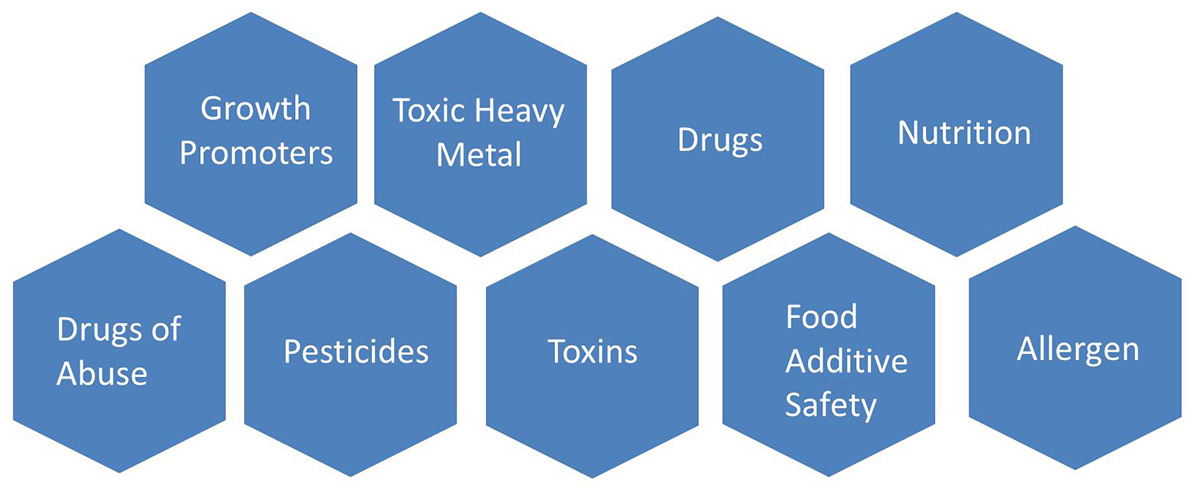Anti-Hapten Antibody Production
Anti-small molecule hapten antibodies enable the detection of small molecules using robust and rapid immune detection technologies, such as ELISA, LFIA and IHC/IF. Either raised against endogenous small molecules (amino acid metabolites, lipids, saccharids, nucleotides, steroids, ...) or exogenous compounds (drug and pesticide residues, chemical pollutants,...), anti-hapten antibodies constitute attractive detection tools not only in the field of human health, for diagnostic and therapeutic applications, but also in areas such as food safety and environmental monitoring.

View all off-the-shelf small molecule antibody products
Combining 15 years of experience in the development of small molecule antibodies, Creative Diagnostics holds a specific expertise in the design of small molecule / protein carrier adducts. Based on our capacities in antigen design, we developed high quality small molecular monoclonal antibodies against a variety of targets.
Our advantages of custom small molecule mAbs services
- A personalized strategy for antigen design, based on an in-depth analysis of the physico-chemical properties, immunogenicity and potential competitors of the small molecule target to address, and tailored to the client's intended use of the antibody. Read MoreFor antibody production, the hapten must contain active groups such as hydroxyl, carboxyl, amino etc. Theoretically the small molecules can be directly coupled with the carrier protein, but sometimes the small molecules with simple structures cannot be recognized by the immune system. Adding a certain length of the interval arm to the proton protrusions on the surface of the carrier protein will significantly improve the immune efficiency, thereby increasing the chances of producing antibodies against hapten. When conjugating a small molecule with complex structure, it is not necessary to add a spacer arm.
- Quality controls, 24 hours services, Go/No-Go decisions points at the end of each phase, for transparent projects with limited risk and reasonable costs.
- Full ownership of the antibody-producing clone is granted to the client at the end of the study, together with at least 3mg of purified monoclonal immunoglobulin.
| Summary of Project Proposed: | |||
| Phase | Summary | Description | Time |
| 1 | Synthesis of Immunogens | Small molecule conjugation to carrier proteins KLH for immunization. Small molecule conjugation to carrier proteins BSA for assay. Client provides small molecule to be conjugated. | 1-2 weeks |
| 2 | Immunization | Immunization of 5 Balb/c mice with antigen (up to 4 times) and determination of antibody titer by ELISA. Animals with highest serum antibody titers are selected for fusion. | 6-8 weeks |
| 3 | Fusion and Screening | Fusion of spleen cells from selected mice with myeloma cell line. ELISA screening. Selection of clones producing specific antibody. | 3-4 weeks |
| 4 | Subcloning and Generation | Subcloning and generation of monoclonals from 3 best chosen clones. Expansion & storage of 3 vials each of the subclones. | 6-7 weeks |
| 5 | Antibody Production | Production of antibodies on cell culture. Protein G purification + ELISA validation. | 2-3 weeks |
Deliverables:
- 3 vials each of 3 antigen specific subclones (>90% clonality and single isotype), storage for 1 year.
- 3-5 mg of purified antibody.
- ELISA data for a) mouse sera; b) 6x 96 well fusion plates; c) up to 96 selected positive wells from fusion plates (repeat validation); and d) subclones ELISA data.
- Productivity and Clonality data for 3 chosen clones.
- Mycoplasma test results & isotyping data for heavy & light chains.
Terms & Conditions:
- Client to provide 5 - 10 mg of small molecule for conjugation to carriers.
- Conjugation cost and quality not guaranteed until we know the molecule structure.
- We accept payment by check, credit card, debit card, and bank transfer.
- Payment required in 3 installments before the beginning of each phase of work.
- All our services are guaranteed. Contact us for reference about our excellent services.
Creative Diagnostics also offers custom services for the detection of small molecules in biological samples.
- Antigen design
- Anti-small molecule hapten antibody production
- Method development and validation for small molecule detection (ELISA, LFIA)